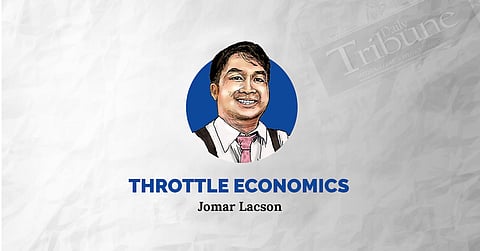
- NEWS
- the EDIT
- COMMENTARY
- BUSINESS
- LIFE
- SHOW
- ACTION
- GLOBAL GOALS
- SNAPS
- DYARYO TIRADA
- MORE

Like Tom Clancy’s best-selling novel, the situation with the US reciprocal tariffs issued by President Donald Trump is truly the sum of all fears.
It represents the possibility of a resurgence in inflation, the onset of a global recession, an intensification of geopolitical conflicts and regional fragmentation.
By the end of the week, President Trump issued a 90-day pause on the reciprocal tariffs except for those applied to US imports from China.
The reciprocal tariff exchange between US and China resulted in US imports from China now being charged a 145-percent tariff rate while Chinese imports from the US have a tariff rate of 125 percent. China then declared this would be its highest tariff rate since increasing tariffs would be pointless as US products would be priced out of the market.
For its part, the Philippines appears to have joined its ASEAN peers in staying united and not responding to the US reciprocal tariffs with their own.
The Prime Minister of Singapore, Lawrence Wong, recently bluntly described the situation thus: “(The tariffs) accelerate the fracturing of the global economy… and increase the likelihood of a global trade war.” (https://www.pmo.gov.sg/Newsroom/Ministerial-Statement-by-PM-Lawrence-Wong-on-the-US-Tariffs-and-Implication)
The issue is not just a matter of negotiations, but as PM Wong also warned: “…protectionism is bad enough, but unstable protectionism is worse.” Businesses cannot plan in an environment of uncertainty.
How did we get to this situation?
The global trade order that we know today is a rules-based trading system under the World Trade Organization (WTO) and its precursor, the General Agreement on Tariffs and Trade (GATT). The GATT was driven by a desire to reduce trade barriers and help economic growth just as countries affected by World War 2 were rebuilding their factories and sought to expand market access.
Essentially, the global levels of economic development when the GATT-WTO were created are substantially different from what they are today. Developing countries back then included China, South Korea, and the ASEAN-5 members.
Despite their massive growth in industrialization (Philippines is the oddity in the list), it is only South Korea that no longer identifies itself as a developing nation. The expansion of trade created by the reduction of trade barriers under WTO has done a good job in uplifting many developing countries from extreme poverty.
Perhaps it did its job too well. Under the Easterlin Paradox, empirical evidence at the country level shows happiness is a function of absolute and relative income. In other words, more money makes you happy, but how much money your neighbor makes also affects your level of happiness.
Clearly, a segment of the US is unhappy. It may be drastic, but the tariffs highlight the need to review the rules and principles of the global trade system and consider that the parity of development has changed. While a global trade war is looming, we should take a step back and see this as an opportunity for a redo.
Reciprocal tariffs are a form of market intervention that, in a sense, helps equalize global costs.
Given that the relative differences in tariffs are about to change and possibly alter the global value chain in our favor, this may be a chance for the Philippines to boost industrialization and join our ASEAN peers in development.
However, because the situation is dynamic, the sum of all fears is not as simple as adding all the tariff rates. The outlook is still dependent on the decisions of all the players in this game of global trade.
There will be alliances formed and fragmented. Not all the decisions will be fair. But make no mistake, there is a global reorder.
The most important thing the Philippines can do with this change is not to focus on the sum of all fears but on the product or multipliers that can enable the economy to leapfrog into better times.
